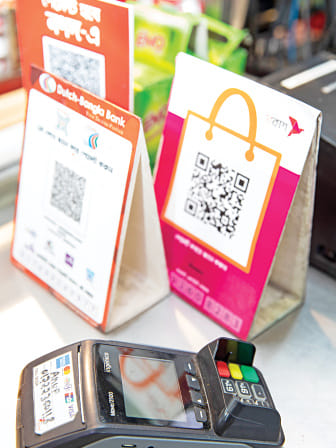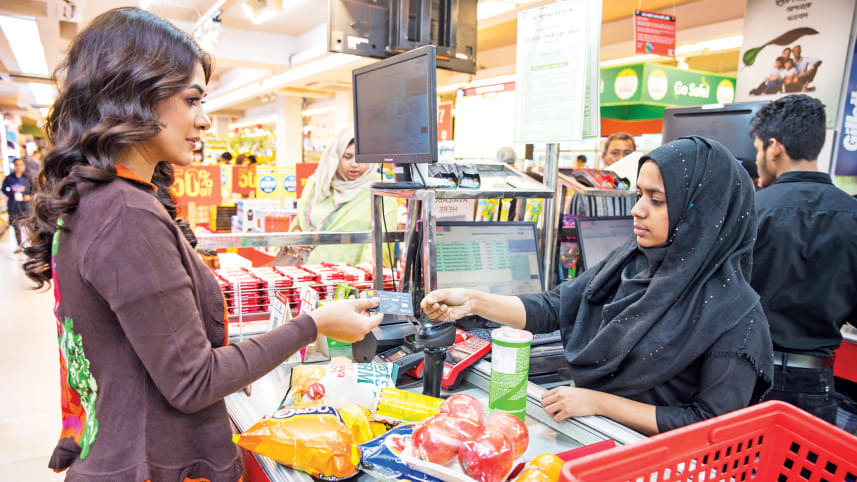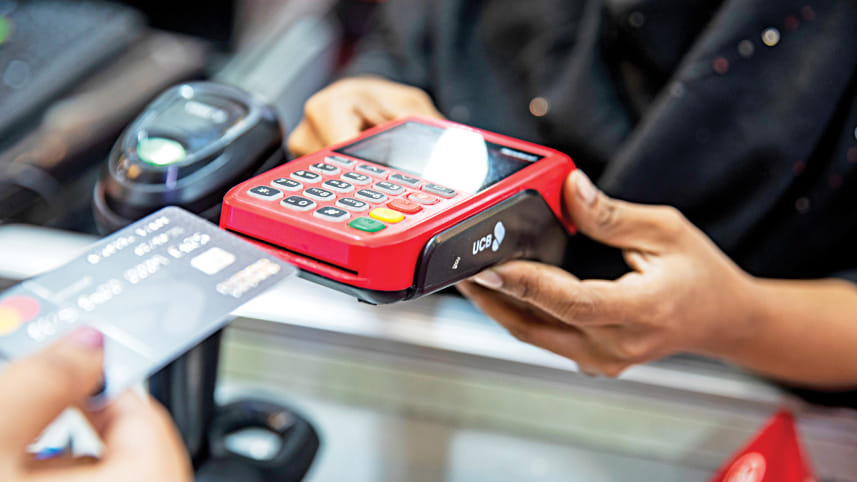Cashless is the future


The food delivery man rings the doorbell. "Apa, here's the naga momo that you ordered." A bit muffled and more so happy that something appetising has been ordered by the teen in the house, I begin to look for my wallet, only to discover that the delivery boy had disappeared in a jiffy, setting the realisation that it's no longer the era of the paper note, but of the cashless society, which relies heavily on fintech companies and online banking; meaning the money had already been paid in advance!
"People find cashless transactions more convenient," said Nahid Farzana, Head of Cards, Eastern Bank Ltd. (EBL), adding "The pandemic has made the transition even more convenient."
So, how can this fact be translated into the future of consumerism?
Online shopping
Many stores have turned to the e-commerce market during the pandemic. Many of the retail fashion brands had to close down their physical outlets due to the rising cost of operations compared to the lack of direct sales. This is the time when most outlets took up space in the world wide web or only continued to work with their online existence.
Sabera Anwar, owner of Panache Hub and Sabera Anwar Designs, created the Go Deshi platform back in 2020, with a single ideology in mind; to help local brands survive through tough times.
"What started as a purely online brand with cashless payments and fintech support has grown to include a physical store after the pandemic.
But our online store is still famous, it's quite active on social media and our consumers still prefer to buy goods online where it's convenient for them," said the entrepreneur.
Though online shopping mainly got trendy during 2019-2021, it certainly changed the dynamics of the retail market. Even if people want to return to physical stores nowadays, e-commerce has proven to be a more convenient alternative to the previous retail landscape. Research suggests that this is pushing people to turn towards cashless methods of payment.
How companies are adapting
Banks and finance companies are adapting to the growing market for cashless transactions. They are creating more methods and avenues to proceed with this form of payment, making it accessible to everyone.
Syed Mubdi Munawar, Managing Director of Tradesworth Household Ltd, reflects on the importance of cashless payment in particular direct sales situations.
"To build strong relationships with our regular customers, we have installed the direct sales system through online or telemarketing into our sales policy, whereby our clients can order necessary household items whenever they want and a delivery man supplies the product in little to no time at all to their doorsteps.

Through this delivery process, we have learned that cash payment is sometimes, a major hassle for the customers, and they prefer on-spot credit card payments or pre-paid fintech solutions as an alternative," he said.
Similarly, many of the marketing leaders agree with the above statement, credit cards are the new currency as most buyers have begun to use this specified mode of payment for any sort of transaction. Companies have made it more convenient for their customers to avail of their services by linking their cards to digital devices through apps. And with society becoming cashless, all companies will have to ensure that people have access to digital means of payment.
More cashless payment options
Fintech companies have started to become more mainstream as time progresses. The basic concept is that these digital applications are where one can store money online for any future digital transaction.
Md Hemayet, who is a chauffeur by profession, thinks such online financial options are the best solution for him.
"Whenever I plan on sending a large amount to my village home, I use Bkash or Nagad as a medium, because they are so convenient. I don't need to go to the bank and make any requests, these can be directly done right here with a few taps on a smartphone while I am working. It's hassle-free and my time is not wasted."

Research suggests that the masses in Bangladesh, especially the working population are finding these new high-tech financial solutions more convenient than enrolling with a traditional bank.
how long before cashless society becomes a reality?
Recently, a couple who have decided to remain anonymous made a strong statement to this media — "Thank God we had balance in our international credit cards. Otherwise, we don't know how we would have survived in Dubai (a country that has largely gone cashless) even for a day. Not even the fast-food joints accept cash! We would recommend everyone before they travel to a foreign country to google online about a country's preferred mode of payment. Otherwise, a nice trip can go down the drain."
This does not mean that the world is ready to go completely cashless. There is still some hope for the paper note!
Monjurul Abedin, a long-time teacher by profession and currently retired for some twenty years, has still not adapted to the concept of going completely cashless.

"I think credit cards encourage people to spend mindlessly and cause them to end up with huge debts. I am very much old-school and I still prefer to spend from what I earn as pension and Sanchayapatra profits every month," said the octogenarian.
People like Abedin and a few others may still revolt at the idea of going completely cashless, but they have to certainly make way for the future generation, who are keen on the concept.
Sajidul Haque, a second-year university student and also a teaching assistant at the university he studies, prefers the cashless mode of payment any day.
"Of course, cashless is the way of the future! There's no point in making your wallet heavy when you can go cashless everywhere. Plus, it also keeps you safe from theft and robbery," revealed Haque.
Going cashless is the future
With so many countries around the world taking major steps towards a cashless world, it is only inevitable that Bangladesh will follow suit. It will be a major shift for the country, but if it is the direction that the entire world is heading, then there's no point in any sort of resistance. Rather, financial companies should be more proactive in this regard and make the transition from paper notes to cashless smoother.
Photo: Sazzad Ibne Sayed
Model: Hritika
Makeup: Sumon
Styling: Sonia Yeasmin Isha
Location: Shawpno



 For all latest news, follow The Daily Star's Google News channel.
For all latest news, follow The Daily Star's Google News channel.
Comments